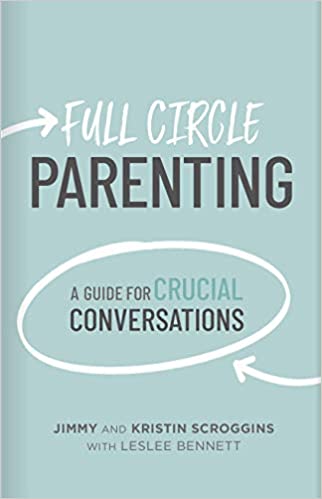“Parenting isn’t for wimps.” That’s how Jimmy and Kristin Scroggins open their book, Full Circle Parenting: A Guide for Crucial Conversations. In the chapters that follow, they show you why. But more importantly, they show you how to approach parenting with wisdom, grit, and gospel focus.
They do so with the recognition that “Christian parents have to have rock-ribbed convictions, nerves of steel, tender hearts, and open arms—all accompanied by a fantastic poker face” (3). This sort of honesty is refreshing, because when it comes to books on parenting, all too often we’re met with content that is laughably formulaic. A three-step strategy that offers a fast track to turning your child into a Christian, an honor-role student, and homecoming king is sure to sell copies. The only downside: it’s never that simple.
Not only that, but in the publishing world it’s mystifyingly easy to find marriage books written by near-newlyweds, or parenting books from authors who are looking forward to their child’s upcoming graduation — from kindergarten. Instead, the best sorts of books in this vein are from those who are further along and offering wisdom that only comes from experience and tempering. Jimmy and Kristin Scroggins offer precisely this sort of wisdom, and, frankly, are precisely the kind of parents I would want to emulate myself.
Over the course of the book, the authors work through a series of topics that will be of use to any parent: sexuality, technology, peer pressure, realities of substance abuse, bullying, and how to have challenging conversations. Throughout these topics, several things in particular stand out.
Full-Circle Parenting is realistic
Jimmy and Kristin Scroggins provide a remarkably clear-eyed view of the challenges that come with parenting, particularly in chapter two, which lays out a Christian vision for parenting, and chapter three, which outlines how children themselves are complex. Throughout, the authors explain how sin warps both parents and children. Children, for example, are going to act in stupefyingly inconsistent ways — even “good” kids. Like the pediatrician reassuring the anxious young parents, “Oh, that cough you heard is completely normal and you needn’t worry,” Jimmy and Kristin Scroggins remind us what we should expect when we approach parenting.
Full-Circle Parenting is gospel-focused
Additionally, Full-Circle Parenting moves beyond a vision of what’s to be expected, to how we may address each of these topics in the context of the gospel. Each of the subjects the authors cover are placed in the context of the 3 Circles tool — which traces God’s design for our lives, the sin which leads to brokenness in our lives, and the remedy of repentance and belief in the gospel that allows us to recover and pursue God’s original design. This tool, originally conceived as a tool for evangelism and gospel presentation, is endlessly helpful when applied to issues of parenting and the Christian life as well. These aren’t “Jesus bits” tacked on at the end of a chapter but rather than main thread that weaves together everything the authors say on a given topic. Grounding each one in the context of God’s design, sin, repentance, and flourishing is not only helpful and practical but exactly what a Christian book should be.
Full-Circle Parenting is timeless
Thankfully, this book does not provide granular advice on how to block harmful websites or how to utilize particular apps to track location or whatever the case may be. As necessary as this sort of information is, these technologies move far faster than the publishing industry does. Instead, Full-Circle Parenting writes from a decidedly 21st-century context, but one that speaks to issues in ways that will be still be relevant 10 and 20 years from now. Instead of, for example, providing a specific age and kind of phone to provide to one’s children, the authors talk about the principles dictating how they use phones, who is responsible for them, how we should think about technology, and how we can model what we prioritize in our own lives. This kind of counsel does not suffer from an expiration date.
Full-Circle Parenting is practical
Perhaps the most noteworthy element of Full-Circle Parenting is just how endlessly practical it is. Throughout the book, there are sample conversations of how to address situations with one’s children and scripts to give to children to help them navigate difficult conversations. There are innovative ideas, like “sibling time” in chapter seven, which details specific ways Jimmy and Kristin have sought to create a culture of togetherness and friendship within their family. There are candid admissions about how they counsel their children to deal with peer pressure and bullies. Most importantly, there are gospel principles throughout which will continually remind readers of the foundational issue (and solution) behind every problem.
In all, Full-Circle Parenting succeeds most notably in providing an honest and compelling vision of what it takes to parent faithfully: both gospel and grit. It focuses on the importance of creating an environment where families can thrive, modeling a life that children can emulate, and providing a tool that parents in all life stages can use to think clearly and biblically about how to shepherd their children faithfully and point them to the gospel. Parents should read it; pastors should stock their shelves with it; and churches should give it away regularly.
One of things on social media I regularly enjoy is when Jimmy Scroggins posts video clips of athletic coaches talking about discipline, strategy, effectiveness, skill development, and growth, or any number of issues. When he does, he often adds a single line of commentary above: “Pastors should learn from coaches.” In their new book, however, Jimmy and Kristin Scroggins are themselves the coaches — outstanding ones we should all learn from.











